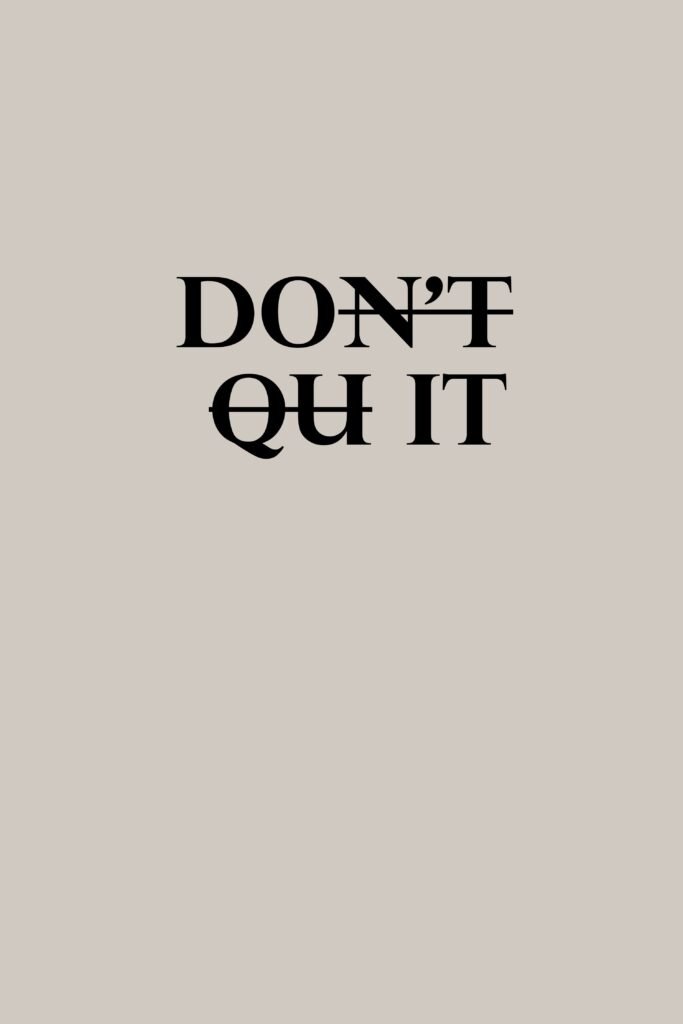You’re not a quitter. That’s just your self-limiting belief.
When you start a new skill, hobby, course or job, you are filled with excitement since you are venturing into new territory, and you have those butterflies in your stomach that come with doing something new. You’re looking forward to how much you can learn in a short period of time because you’re stepping into a new environment where it’s easier to grasp by looking at others doing the same things. But as the days go by, that initial excitement fades, and you get overwhelmed by the scope of work and all the responsibilities you must perform because of the expectations you put on yourself.
Things get real suddenly, and you realise how mammoth the task is and how hard you have to work to get anywhere good at the skill you’re trying to achieve. And how much time it will take to get where you want to go.
If you’re working in a new role, you might be overwhelmed by your boss’s expectations of you and worried about what they’ll think if you don’t perform well this quarter. All this anxiety and nervousness makes you want to quit, so you start with not putting your full potential into the job, aka quiet-quitting.
It’s easier to get overwhelmed and not try harder because your own expectations loom large in your head.
What can you do about this?
You can start by analysing what’s working for you, and when you’ve done that, pat yourself on the back. You’ve already walked through the tightrope and experienced half the trouble.
Next, you have to identify what’s not working for you, so take a piece of paper and list reasons why you feel something isn’t working for you and how it is holding you back. Maybe you’ve taken too much on your plate and might not have the mental bandwidth to keep up with it.
For now, you’re listing down things and are encouraged to self-reflect on them.
You could just be trying to form too many new habits at once.
After this, you need to check what you can subtract from your habits stack and see if it influences your mood, whether the changes are positive, negative or neutral, and write it down.
Habit stacking is a great tool to have in your toolkit to get the most out of your new habit.
If you’re working in a fast-paced environment and finding it hard to keep up with the ongoing slew of work, maybe having an honest chat with your manager will be a good idea. Take a moment to reach out to your colleagues. Ask for guidance on what you can change and improve. This opportunity will let them help you with areas where you really need work. And maybe they will help you or recommend a system that works for you. It might be something that will help you perform better at work.
The thing you have to understand is that you rarely have to do it all at once, and you can break your big tasks into bite-sized chunks of work that helps your mind process them better, and it will help you relax even when there’s a lot of responsibility on your shoulders.
You don’t have to let the pressure mount by ignoring the tasks you have to accomplish. Give yourself space to do as much as you can and move on. You can’t let yourself doom-spiral because of your perfection instincts.
What if it still doesn’t help?
You have to think about your whole habit-building strategy along the lines of input-based goals. Most of the time, we, as people, get derailed from building long-lasting habits because we are busy focusing on outcomes rather than how much time and energy we are putting in to get a specific result. While outcomes are important (since they tell us if a strategy is working out or not) and serve as guiding lights on our journey, we still have to have something to hold on to till we get our desired results.
My strategy to deal with that inner gloom and doom, self-doubt and doom spiral is to focus on my input, aka the effort I’m putting into achieving my goals. This input-based goals strategy is what I used to lose weight in 2023 because I went out to the gym for six months and six days a week, working out regularly without seeing any results.
Input-based goals work because they free your mind and alleviate some inner pressure we put on ourselves to perform despite not reaching our goals.
Conclusion
While it’s good to put pressure on yourself to perform and get better at something, you should be mindful of how much pressure you’re actually putting on yourself. Too much pressure than what you can handle has the opposite effect on your efforts since it results in you getting overwhelmed and not doing anything at all.
And that’s not good for your mental health or your long-term success. A small change in mindset can lead you to big things. Be patient and keep working towards your goals.
Your time will surely come.
As we say in Hindi, ‘Worry about your efforts, don’t worry about the outcomes.” (Karam karte raho, fal ki chinta mat karo.)
Have you found yourself quitting any of your habits so far? Tell me more about it in the comments.
To get more insights from me, check out my social media, Twitter and LinkedIn.
Want a system to organise your habit tracking and daily life? Grab my Aesthetic & Simple Everyday Planner (2024) template.
If you found this post helpful, buy me a coffee.
Thank you for reading!
